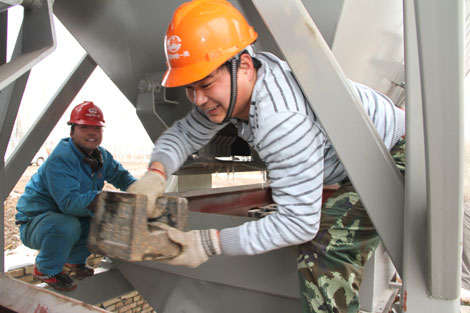Programs help Uygur women to self-reliance
Updated: 2012-05-22 11:23
By Shao Wei in Kashgar, Xinjiang (China Daily)
|
||||||||
|
 |
|
Workers at a construction site of the Shenzhen Kashgar Avenue, the key infrastructure construction project of the EDZ in Kashgar, the Xinjiang Uygur autonomous region. [Photo / China Daily] |
Training initiatives changing traditional mindset, benefit economic development
Ayigul may work for a domestic services company, but she is no housekeeper.
Perfectly made-up, immaculately groomed and speaking fluent Chinese, she looks like a textbook example of a white-collar professional.
The 30-year-old Uygur woman works as a mentor at a Shenzhen-based domestic help company in Kashgar, Northwest China's Xinjiang Uygur autonomous region.
"I was totally another person before I came here nearly a year ago. The job has changed me a lot," she said.
In May 2011, Ayigul got a chance to receive free training from the company to learn housekeeping services. Thanks to her hard work and excellent record as a trainee, she was hired full time to teach other Uygur women vocational skills, such as senior care, home care for the sick and baby-sitting.
"In front of my students, who are interested in learning skills and working outside, I feel happy," she said.
Before she joined the company, her life had been different.
Soon after graduating from Kashgar Health School in 2006, she married a truck driver, and she has "worked for a total of three months in the past five years".
"My husband didn't let me work outside. As the custom goes, we Uygur women can't work outside the home. We're supposed to stay at home, cooking and caring for the families. But I've learned to rely on my own hands and live independently. With my education and hard work, I deserve a better life."
Ayigul and her husband separated after he beat her several times for trying to work outside the home. She now takes care of their 4-year-old daughter alone.
"Ayigul is walking proof that women can have a better life by relying on themselves," said Wang Yanliu, director of Jinguo Housekeeping Co, where Ayigul works.
Wang's company came to Kashgar in May 2011 but met with "unexpected troubles" in the beginning.
"We saw huge market potential in Kashgar because there were no professional domestic help companies before we came. First, we held two free training sessions for 218 local women. Astonishingly, no one was willing to work after they completed the training," Wang recalled.
"The minds of local women were closed, and they had no idea how to stand on their own feet. So changing their traditional mindset became the key subject we needed to teach," she added.
The company has since offered 16 training sessions to about 1,500 local women, and 65 percent of them have found work.
Training programs like these are part of an overall strategy to spur growth in the area. In 2010, the central government introduced a plan to make Kashgar into an economic development zone and a prosperous trading post for China's Central Asian neighbors. But poor infrastructure has been a constant obstacle, said Zhu Tingfeng, chief of Shenzhen's department for assistance to Xinjiang.
"Compared with coastal cities in China, Kashgar is blocked and backward, and the economy remains at the level of the 1980s,"Zhu said.
"The unprecedented rapid development in Kashgar has also brought difficulties, such as a lack of laborers. So we bring designing and construction teams from Shenzhen to Kashgar, wishing to bring developed ideas and techniques to the area," said He Ru, director of project office of the department.
Kashgar has geographical advantages that will help it connect with the outside world, such as its close proximity to four land ports bordering Kyrgyzstan, Tajikistan and Pakistan.
"While experts from Shenzhen are being dispatched by the central government to help develop Kashgar Economic Development Zone, we are working on bettering the city's infrastructure, making a strategic development plan and in so doing, attracting businessmen from home and abroad to Kashgar," said Zhu.
Since May 2010, when the central government called for 19 developed provinces and cities to assist Xinjiang, 187 experts from Shenzhen have been sent to Kashgar, and a total of 1.25 billion yuan ($197 million) has been poured into its economic development.
shaowei@chinadaily.com,cn

 Relief reaches isolated village
Relief reaches isolated village
 Rainfall poses new threats to quake-hit region
Rainfall poses new threats to quake-hit region
 Funerals begin for Boston bombing victims
Funerals begin for Boston bombing victims
 Quake takeaway from China's Air Force
Quake takeaway from China's Air Force
 Obama celebrates young inventors at science fair
Obama celebrates young inventors at science fair
 Earth Day marked around the world
Earth Day marked around the world
 Volunteer team helping students find sense of normalcy
Volunteer team helping students find sense of normalcy
 Ethnic groups quick to join rescue efforts
Ethnic groups quick to join rescue efforts
Most Viewed
Editor's Picks

|

|

|

|

|

|
Today's Top News
Health new priority for quake zone
Xi meets US top military officer
Japan's boats driven out of Diaoyu
China mulls online shopping legislation
Bird flu death toll rises to 22
Putin appoints new ambassador to China
Japanese ships blocked from Diaoyu Islands
Inspired by Guan, more Chinese pick up golf
US Weekly

|

|







